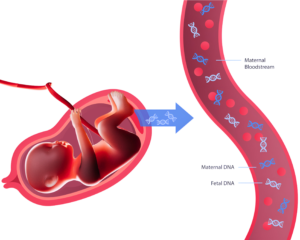Non-invasive prenatal testing (NIPT) also known as Non-Invasive Prenatal Screening (NIPS) and cell-free DNA testing is an advanced addition to the range of antenatal tests to screen your baby for certain genetic abnormalities. Throughout the pregnancy, mother’s blood stream contains circulating small fragments of DNA called Cell-free DNA (cfDNA) coming from her own cells and the placenta- the tissue that connects the baby with the mother. The DNA of this placental cells is almost identical to the DNA of the fetus and hence being analyzed for the early detection of certain genetic abnormalities that arise in the growing babies.


NIPT is considered noninvasive because it requires just the blood sample from the pregnant women and does not cause any risk to the fetus but assess the fetal genetic material. It can be performed much earlier compared to the other conventional prenatal tests like Chorionic villus sampling and Amniocentesis.
NIPT is often employed to look for chromosomal disorders caused due to missing or extra copies of chromosomes. It shows increased sensitivity and specificity for the most common genetic chromosomal disorder, Down syndrome superior to any other screening tests. The accuracy of the test varies by the disorder for the common trisomies like trisomy21, trisomy18 & trisomy13. Extended panels includes microdeletion and duplication conditions like Di George, Cri du Chat, Prader Willi/Angelman syndromes, 1p36 deletion, Jacobson syndrome, Wolf Hirschhorn syndrome.


